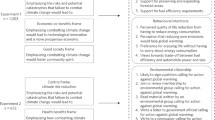Abstract
Does “climate change” seem like a less serious problem than “global warming” to Americans and Europeans? Does describing the costs of climate change mitigation in terms of “higher taxes” instead of “higher prices” reduce public support for such efforts? In an experiment embedded in an American national survey, respondents were randomly assigned to rate the seriousness of “global warming,” “climate change,” or “global climate change.” Contrary to predictions made by a leading political strategist, the full sample and political Independents perceived “climate change” and “global warming” to be equally serious. Among Republicans, “climate change” was perceived to be more serious than “global warming,” whereas the reverse was true among Democrats. A similar experiment embedded in a survey of residents of 31 European countries showed that “global warming” and “climate change” were perceived to be equally serious problems. And an experiment embedded in an American survey showed that describing the increased costs of climate change mitigation legislation via “higher taxes” instead of via “higher prices” did not reduce popular support for such legislation, also contradicting a political strategy memo. Thus, word choice may sometimes affect public perceptions of the climate change seriousness or support for mitigation policies, but a single choice of terminology may not influence all people the same way, making strategic language choices difficult to implement.
Similar content being viewed by others
References
Brislin RW (1970) Back translation for cross-cultural research. J Cross-Cult Psychol 1:185–216
Butler K (2004) Winning words: George Lakoff says environmentalists need to watch their language. Sierra 89:54–56
Dunlap RE, McCright AM (2008) A widening gap: republican and democratic views on climate change. Environment 50:26–35
Dunlap RE, Xiao C, McCright AM (2001) Politics and environment in America: partisan and ideological cleavages in public support for environmentalism. Env Polit 10:23–48.
European Commission (2009) Eurobarometer 69.2: National and European Identity, European Elections, European Values, and Climate Change, March–May 2008, (Computer file). Conducted by TNS OPINION & SOCIAL, Brussels, requested and coordinated by the European Commission, Directorate General Press and Communication, Opinion Polls. ZA4744 [version identification], Cologne Germany: GESIS, 2009
Krosnick JA, Schuman H (1988) Attitude intensity, importance, and certainty and susceptibility to response effects. J Pers Soc Psychol 54:940–952
Lakoff G (1996) Moral politics: what conservatives know that liberals don’t. University of Chicago Press, Chicago
Lakoff G (2004) Don’t think of an elephant: know your values and frame the debate. Chelsea Green Publishing, White River Junction
Lorenzoni I, Leiserowitz A, De Franca Doria M, Poortinga W, Pidgeon NF (2006) Cross-national comparisons of image associations with “global warming” and “climate change” among laypeople in the United States of America and Great Britain. J Risk Res 9:265–281
Luntz F (1988) Candidates, consultants, and campaigns: the style and substance of American electioneering. Blackwell, New York
Luntz F (2002) The environment: a cleaner, safer, healthier America. Luntz Research, Alexandria
Luntz F (2007) Words that work: it’s not what you say, it’s what people hear. Hyperion, New York
Malka A, Krosnick JA (2009) The association of knowledge with concern about global warming: trusted information sources shape public thinking. Risk Anal 29:633–647
Senate EPW Staff (2009) A strategy for climate change: consumers vs. big business. Memo written to the House and Senate energy and environment staff, May 14, 2009.
TNS Opinion & Social (2008) Europeans’ attitudes towards climate change. Special Eurobarometer 300, Wave 69.2. European Commission, Brussels
Whitmarsh L (2009) What’s in a name? Commonalities and differences in public understanding of “climate change” and “global warming”. Public Underst Sci 18:401–420
Author information
Authors and Affiliations
Corresponding author
Additional information
This project was funded by the Woods Institute for the Environment. The data used in Study 3 were collected in a survey funded by the Associated Press and the Woods Institute for the Environment at Stanford University. The authors thank Trevor Tompson for his collaboration, Kinesis Survey Technologies for carrying out the data collection for Study 1, and Survey Sampling International for providing the respondent sample for Study 1. Jon Krosnick is University Fellow at Resources for the Future.
Rights and permissions
About this article
Cite this article
Villar, A., Krosnick, J.A. Global warming vs. climate change, taxes vs. prices: Does word choice matter?. Climatic Change 105, 1–12 (2011). https://doi.org/10.1007/s10584-010-9882-x
Received:
Accepted:
Published:
Issue Date:
DOI: https://doi.org/10.1007/s10584-010-9882-x




